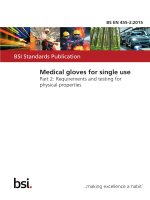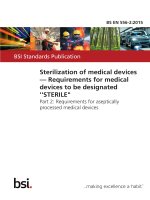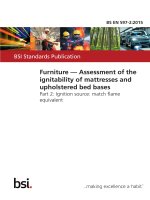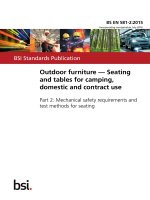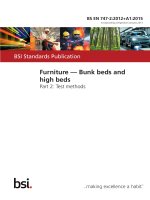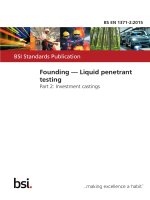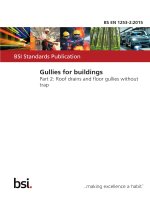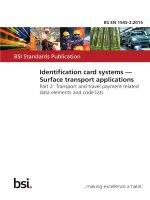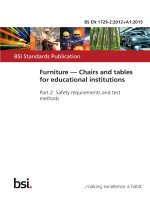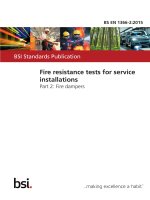Bsi bs en 61010 2 061 2015
Bạn đang xem bản rút gọn của tài liệu. Xem và tải ngay bản đầy đủ của tài liệu tại đây (1.18 MB, 22 trang )
BS EN 61010-2-061:2015
BSI Standards Publication
Safety requirements for
electrical equipment for
measurement, control and
laboratory use
Part 2-061: Particular requirements for
laboratory atomic spectrometers with
thermal atomization and ionization
BRITISH STANDARD
BS EN 61010-2-061:2015
National foreword
This British Standard is the UK implementation of EN 61010-2-061:2015.
It is identical to IEC 61010-2-061:2015. It supersedes BS EN 61010-2-061:2003,
which will be withdrawn on 14 April 2018.
The UK participation in its preparation was entrusted to Technical
Committee EPL/66, Safety of measuring, control and laboratory
equipment.
A list of organizations represented on this committee can be obtained on
request to its secretary.
This publication does not purport to include all the necessary provisions of
a contract. Users are responsible for its correct application.
© The British Standards Institution 2015.
Published by BSI Standards Limited 2015
ISBN 978 0 580 79880 1
ICS 19.080; 71.040.20
Compliance with a British Standard cannot confer immunity from
legal obligations.
This British Standard was published under the authority of the
Standards Policy and Strategy Committee on 31 May 2015.
Amendments/corrigenda issued since publication
Date
Text affected
BS EN 61010-2-061:2015
EUROPEAN STANDARD
EN 61010-2-061
NORME EUROPÉENNE
EUROPÄISCHE NORM
April 2015
ICS 19.080; 71.040.20
Supersedes EN 61010-2-061:2003
English Version
Safety requirements for electrical equipment for measurement,
control and laboratory use - Part 2-061: Particular requirements
for laboratory atomic spectrometers with thermal atomization and
ionization
(IEC 61010-2-061:2015)
Règles de sécurité pour appareils électriques de mesurage,
de régulation et de laboratoire - Partie 2-061: Exigences
particulières pour spectromètres atomiques de laboratoire
avec vaporisation et ionisation thermiques
(IEC 61010-2-061:2015)
Sicherheitsbestimmungen für elektrische Mess-, Steuer-,
Regel- und Laborgeräte - Teil 2-061: Besondere
Anforderungen an Labor-Atomspektrometer mit thermischer
Atomisierung und Ionisation
(IEC 61010-2-061:2015)
This European Standard was approved by CENELEC on 2015-04-14. CENELEC members are bound to comply with the CEN/CENELEC
Internal Regulations which stipulate the conditions for giving this European Standard the status of a national standard without any alteration.
Up-to-date lists and bibliographical references concerning such national standards may be obtained on application to the CEN-CENELEC
Management Centre or to any CENELEC member.
This European Standard exists in three official versions (English, French, German). A version in any other language made by translation
under the responsibility of a CENELEC member into its own language and notified to the CEN-CENELEC Management Centre has the
same status as the official versions.
CENELEC members are the national electrotechnical committees of Austria, Belgium, Bulgaria, Croatia, Cyprus, the Czech Republic,
Denmark, Estonia, Finland, Former Yugoslav Republic of Macedonia, France, Germany, Greece, Hungary, Iceland, Ireland, Italy, Latvia,
Lithuania, Luxembourg, Malta, the Netherlands, Norway, Poland, Portugal, Romania, Slovakia, Slovenia, Spain, Sweden, Switzerland,
Turkey and the United Kingdom.
European Committee for Electrotechnical Standardization
Comité Européen de Normalisation Electrotechnique
Europäisches Komitee für Elektrotechnische Normung
CEN-CENELEC Management Centre: Avenue Marnix 17, B-1000 Brussels
© 2015 CENELEC All rights of exploitation in any form and by any means reserved worldwide for CENELEC Members.
Ref. No. EN 61010-2-061:2015 E
BS EN 61010-2-061:2015
EN 61010-2-061:2015
-2-
Foreword
The text of document 66/553/FDIS, future edition 3 of IEC 61010-2-061, prepared by
IEC/TC 66 "Safety of measuring, control and laboratory equipment" was submitted to the
IEC-CENELEC parallel vote and approved by CENELEC as EN 61010-2-061:2015.
The following dates are fixed:
•
latest date by which the document has to be
implemented at national level by
publication of an identical national
standard or by endorsement
(dop)
2016-01-14
•
latest date by which the national
standards conflicting with the
document have to be withdrawn
(dow)
2018-04-14
This document supersedes EN 61010-2-061:2003.
Attention is drawn to the possibility that some of the elements of this document may be the subject of
patent rights. CENELEC [and/or CEN] shall not be held responsible for identifying any or all such
patent rights.
This standard covers the Principle Elements of the Safety Objectives for Electrical Equipment
Designed for Use within Certain Voltage Limits (LVD - 2006/95/EC).
Endorsement notice
The text of the International Standard IEC 61010-2-061:2015 was approved by CENELEC as a
European Standard without any modification.
-3-
BS EN 61010-2-061:2015
EN 61010-2-061:2015
Annex ZA
(normative)
Normative references to international publications
with their corresponding European publications
The following documents, in whole or in part, are normatively referenced in this document and are
indispensable for its application. For dated references, only the edition cited applies. For undated
references, the latest edition of the referenced document (including any amendments) applies.
NOTE 1 When an International Publication has been modified by common modifications, indicated by (mod), the relevant
EN/HD applies.
NOTE 2 Up-to-date information on the latest versions of the European Standards listed in this annex is available here:
www.cenelec.eu.
Annex ZA of Part 1 applies.
–2–
BS EN 61010-2-061:2015
IEC 61010-2-061:2015 © IEC 2015
CONTENTS
FOREWORD ........................................................................................................................... 3
1
Scope and object ............................................................................................................. 5
2
Normative references ...................................................................................................... 5
3
Terms and Definitions ...................................................................................................... 5
4
Tests ............................................................................................................................... 6
5
Marking and documentation ............................................................................................. 6
6
Protection against electric shock ..................................................................................... 9
7
Protection against mechanical hazards ............................................................................ 9
8
Resistance to mechanical stresses ................................................................................. 9
9
Protection against the spread of fire .............................................................................. 10
10
Equipment temperature limits and resistance to heat ..................................................... 10
11
Protection against HAZARDS from fluids .......................................................................... 10
12
Protection against radiation, including laser sources, and against sonic and
ultrasonic pressure ........................................................................................................ 11
13
Protection against liberated gases and substances, explosion and implosion ................ 11
14
Components and subassemblies ................................................................................... 13
15
Protection by interlocks ................................................................................................. 13
16
H AZARDS resulting from application ................................................................................ 14
17
R ISK Assessment ........................................................................................................... 14
Annexes ............................................................................................................................... 15
Annex F (normative) Routine tests ....................................................................................... 15
Annex H (informative) Index of defined terms ....................................................................... 15
Bibliography .......................................................................................................................... 15
Figure 101 – Example of a GAS LOCK ..................................................................................... 12
Table 101 – Time-temperature conditions ............................................................................... 9
BS EN 61010-2-061:2015
IEC 61010-2-061:2015 © IEC 2015
–3–
INTERNATIONAL ELECTROTECHNICAL COMMISSION
____________
SAFETY REQUIREMENTS FOR ELECTRICAL EQUIPMENT
FOR MEASUREMENT, CONTROL, AND LABORATORY USE –
Part 2-061: Particular requirements for laboratory atomic
spectrometers with thermal atomization and ionization
FOREWORD
1) The International Electrotechnical Commission (IEC) is a worldwide organization for standardization comprising
all national electrotechnical committees (IEC National Committees). The object of IEC is to promote
international co-operation on all questions concerning standardization in the electrical and electronic fields. To
this end and in addition to other activities, IEC publishes International Standards, Technical Specifications,
Technical Reports, Publicly Available Specifications (PAS) and Guides (hereafter referred to as “IEC
Publication(s)”). Their preparation is entrusted to technical committees; any IEC National Committee interested
in the subject dealt with may participate in this preparatory work. International, governmental and nongovernmental organizations liaising with the IEC also participate in this preparation. IEC collaborates closely
with the International Organization for Standardization (ISO) in accordance with conditions determined by
agreement between the two organizations.
2) The formal decisions or agreements of IEC on technical matters express, as nearly as possible, an international
consensus of opinion on the relevant subjects since each technical committee has representation from all
interested IEC National Committees.
3) IEC Publications have the form of recommendations for international use and are accepted by IEC National
Committees in that sense. While all reasonable efforts are made to ensure that the technical content of IEC
Publications is accurate, IEC cannot be held responsible for the way in which they are used or for any
misinterpretation by any end user.
4) In order to promote international uniformity, IEC National Committees undertake to apply IEC Publications
transparently to the maximum extent possible in their national and regional publications. Any divergence
between any IEC Publication and the corresponding national or regional publication shall be clearly indicated in
the latter.
5) IEC itself does not provide any attestation of conformity. Independent certification bodies provide conformity
assessment services and, in some areas, access to IEC marks of conformity. IEC is not responsible for any
services carried out by independent certification bodies.
6) All users should ensure that they have the latest edition of this publication.
7) No liability shall attach to IEC or its directors, employees, servants or agents including individual experts and
members of its technical committees and IEC National Committees for any personal injury, property damage or
other damage of any nature whatsoever, whether direct or indirect, or for costs (including legal fees) and
expenses arising out of the publication, use of, or reliance upon, this IEC Publication or any other IEC
Publications.
8) Attention is drawn to the Normative references cited in this publication. Use of the referenced publications is
indispensable for the correct application of this publication.
9) Attention is drawn to the possibility that some of the elements of this IEC Publication may be the subject of
patent rights. IEC shall not be held responsible for identifying any or all such patent rights.
International Standard IEC 61010-2-061 has been prepared by IEC technical committee 66:
Safety of measuring, control and laboratory equipment.
It has the status of a group safety publication in accordance with IEC Guide 104.
This third edition cancels and replaces the second edition published in 2003. It constitutes a
technical revision and includes the following change from the second edition:
•
exclusion of equipment, whose size and weight make unintentional movement unlikely,
from the drop test in Clause 8.
•
notes have been re-phrased according to ISO/IEC Directives.
–4–
BS EN 61010-2-061:2015
IEC 61010-2-061:2015 © IEC 2015
The text of this standard is based on the following documents:
FDIS
Report on voting
66/553/FDIS
66/568/RVD
Full information on the voting for the approval of this standard can be found in the report on
voting indicated in the above table.
This publication has been drafted in accordance with the ISO/IEC Directives, Part 2.
A list of all parts of the IEC 61010 series, under the general title: Safety requirements for
electrical equipment for measurement, control, and laboratory use, may be found on the IEC
website.
This Part 2-061 is intended to be used in conjunction with IEC 61010-1. It was established
on the basis of the third edition (2010).
This Part 2-061 supplements or modifies the corresponding clauses in IEC 61010-1 so as to
convert that publication into the IEC standard: Safety requirements for laboratory atomic
spectrometers with thermal atomization and ionization.
Where a particular subclause of Part 1 is not mentioned in this part 2, that subclause applies
as far as is reasonable. Where this part states “addition”, “modification” or “replacement”, or
“deletion”, the relevant requirement, test specification or note in Part 1 should be adapted
accordingly.
In this standard:
1) the following print types are used:
– requirements: in roman type;
– NOTES: in small roman type;
– conformity and test: in italic type;
– terms used throughout this standard which have been defined in clause 3: SMALL ROMAN
CAPITALS ;
2) subclauses, figures, tables and notes which are additional to those in Part 1 are numbered
starting from 101. The additional annexes are lettered starting from AA.
The committee has decided that the contents of this publication will remain unchanged until
the stability date indicated on the IEC web site under "" in the data
related to the specific publication. At this date, the publication will be
•
•
•
•
reconfirmed,
withdrawn,
replaced by a revised edition, or
amended.
BS EN 61010-2-061:2015
IEC 61010-2-061:2015 © IEC 2015
–5–
SAFETY REQUIREMENTS FOR ELECTRICAL EQUIPMENT
FOR MEASUREMENT, CONTROL, AND LABORATORY USE –
Part 2-061: Particular requirements for laboratory atomic
spectrometers with thermal atomization and ionization
1
Scope and object
This clause of Part 1 is applicable except as follows:
1.1
Scope
1.1.1
Equipment included in scope
Replacement:
Replace the text by the following:
This part of IEC 61010 applies to electrically powered laboratory atomic spectrometers with
thermal atomization.
NOTE 1 Examples include atomic absorption spectrometers, emission flame photometers, atomic fluorescence
spectrophotometers, inductively coupled plasma spectrometers, microwave coupled plasma spectrometers and
mass spectrometers, all with thermal atomization and ionization (including tubing and connectors which are
provided by the manufacturer for connection to external supplies).
NOTE 2 If all or part of the equipment falls within the scope of one or more other part 2 standards of IEC 61010
as well as within the scope of this standard, consideration is to be given to those other part 2 standards.
1.1.2
Equipment excluded from scope
Addition:
Add as the first paragraph:
This standard does not apply to thermal atomization detectors (flame ionization detectors)
used in gas chromatography.
2
Normative references
This clause of Part 1 is applicable.
3
Terms and Definitions
This clause of Part 1 is applicable except as follows:
Additions:
Add the following definitions:
3.2.101
SPRAY CHAMBER
chamber in which droplets of sample in aerosol are allowed to separate so that the droplets of
necessary size can be passed onward to the burner, with the remainder draining to waste
–6–
BS EN 61010-2-061:2015
IEC 61010-2-061:2015 © IEC 2015
3.2.102
GAS LOCK
device to allow drainage of waste sample liquid, and to prevent unintentional escape of gas
from the SPRAY CHAMBER through its drain outlet
Note 1 to entry:
See for example Figure 101.
3.5.101
FLASH - BACK
event during which the flame travels back through the burner with the result that the gas in
the mixing chamber is caused to ignite.
4
Tests
This clause of Part 1 is applicable except as follows:
Addition:
Add the following subclauses:
4.4.2.101
Sampling probe tip
Any system designed to withdraw a sampling probe tip after sampling has been completed
shall be overridden, so as to leave the tip in its most exposed position when a sample vessel
is removed.
Exceptions:
The withdrawal system need not be overridden if the sampling probe:
a) cannot cause a HAZARD to the OPERATOR when it is exposed;
b) is designed in such a manner that no SINGLE FAULT CONDITION can cause the tip to remain
exposed after sampling has been completed.
4.4.2.102
Failure, or partial failure, of the MAINS supply
The voltage of the power supply to the equipment from the MAINS supply shall first be reduced
to just less than 90 % of the RATED voltage, and shall then be switched off.
5
Marking and documentation
This clause of Part 1 is applicable except as follows:
Addition:
Add the following subclause:
5.1.5.101
Gas and liquid connections
The following shall be unambiguously marked adjacent to the connector on the equipment
(see 5.2):
a) the identity of the gas or liquid;
b) the maximum permitted pressure,
c) flow direction of the gas and liquid, if applicable.
BS EN 61010-2-061:2015
IEC 61010-2-061:2015 © IEC 2015
–7–
NOTE Such markings may be specific (for example acetylene, propane, water) or generic (for example fuel gas,
oxidant gas, coolant, waste liquid).
Where no internationally recognized symbol (such as a chemical formula) exists, the equipment shall be marked with symbol 14 of Table 1 together with an unambiguous text in English.
The documentation accompanying the equipment shall provide an adequate translation of this
text (where it is required) in the language of the country in which it is to be installed, to assure
that the installer or OPERATOR is able to connect the equipment correctly.
Conformity is checked by inspection.
5.2
Warning markings
Addition:
Add the following paragraph before the conformity statement:
Where hot gases or plasma emerge from equipment, the protective structure provided (for
example a chimney, see 10.1), shall be clearly marked by symbol 13 of Table 1, to indicate
where excessively hot temperatures may exist.
5.4.3
Equipment installation
Addition:
Add before the first paragraph the following new paragraph:
The documentation shall state that the RESPONSIBLE BODY shall ensure that the type of
connector used at the outlet side of the gas-pressure regulator conforms to applicable
national requirements;
Deletion:
Delete item f).
Addition:
Add, after item g) and before the note, the following new items:
aa)
requirements for liquid connection;
bb)
requirements for a fume extraction system to remove exhaust gases which may be
hazardous. In the case of equipment using only a propane flame in a ventilated room,
and when it is known that samples will not leave any hazardous residues, it is not
necessary to provide an extraction system, since the exhaust gases from a propane
flame will themselves not present any hazard.
cc)
requirements for appropriate filtering or other systems which may be necessary to trap
hazardous sample residues present in the exhaust gas stream;
dd)
the documentation shall state that the RESPONSIBLE BODY shall carry out appropriate
leakage tests necessary for safety on those gas and liquid connections which the
OPERATOR is directed to assemble during installation, NORMAL USE , or maintenance;
ee)
instructions for examining, during installation and maintenance, parts of the external gas
supply system including tubing connected to the equipment, in order to confirm that
their condition is satisfactory, for example to detect stress cracks. In addition any
special national regulations for the safe use of gases and gas cylinders shall be
observed.
–8–
BS EN 61010-2-061:2015
IEC 61010-2-061:2015 © IEC 2015
ff)
instructions for necessary provisions for collection of waste from the SPRAY CHAMBER ,
including the requirements for any waste container which may be specified by the
manufacturer;
gg)
requirements for connection of the equipment to supplies of air, fuel gas (for example
hydrogen, acetylene, or propane) and oxidant (for example oxygen or nitrous oxide).
See also 11.103.
Add, after the existing note, the following new notes:
NOTE 101 Connections on the outlet side of gas regulators (from which tubing connects to the equipment) vary
from country to country and are often covered by national regulations. Variations can include thread type, whether
left-hand or right-hand, types of tubing and means of attachment.
NOTE 102
5.4.4
Warning markings are specified in 5.1.101, 5.1.5.2 c), 6.1.2 b), 7.3.2 b) 3), 7.4, 10.1, 13.2.2.
Equipment operation
Additions:
Add, after item j), the following new items:
aa)
a reminder to the RESPONSIBLE BODY of the responsibility for the correct collection and
disposal of waste materials, including the necessity for:
1)
a suitably sized waste container of appropriately resistant material for the collection
of organic solvent waste;
NOTE The proper disposal of waste materials is well documented by national authorities and it is these
procedures supersede the requirements of this standard in regard of waste disposal. This part 2 should only
bring to the attention of the OPERATOR that potentially hazardous waste materials are present and national
(local) regulations for the proper disposal can apply.
2)
bb)
provision for the removal into an appropriate exhaust system of any gases or
vapours which may be produced in hazardous concentrations;
a list of fluids known by the manufacturer to be potentially unsafe if used with the
equipment.
Add a new paragraph after the list of items as follows:
Documentation shall also indicate that this list cannot be taken to be exhaustive and that, in
case of uncertainty about a specific fluid, that fluid shall not be used until confirmation by the
manufacturer that it will not present a HAZARD .
Add the following subclause:
5.4.4.101
Cleaning and decontamination
Documentation shall indicate:
a) that the RESPONSIBLE BODY has the responsibility for carrying out
decontamination if hazardous material is spilt on or inside the equipment;
appropriate
b) manufacturer's recommendations for cleaning and, where necessary, decontamination,
together with the recognized generic names of recommended materials for cleaning and
decontamination.
The following wording shall appear in the documentation:
“Before using any cleaning or decontamination methods except those specified by the
manufacturer, the RESPONSIBLE BODY should check with the manufacturer that the proposed
method will not damage the equipment.”
BS EN 61010-2-061:2015
IEC 61010-2-061:2015 © IEC 2015
–9–
If a manufacturer claims that an item can be decontaminated by steam sterilization, it shall be
capable of withstanding steam sterilization under at least one of the time-temperature
conditions given in Table 101. Cleaning and decontamination shall be necessary as a
safeguard when spectrometers and their accessories are maintained, repaired, or transferred.
Manufacturers shall provide a format for the RESPONSIBLE BODY to certify that such a treatment
has been carried out.
NOTE Information on decontaminants their use, dilution and potential application is contained in the Laboratory
Biosafety Manual, published by the World Health Organization and the Biosafety in Microbiological and Biomedical
Laboratories, published by Centers for Disease Control and Prevention and National Institutes of Health,
Washington. There are also national guidelines that cover these areas.
Table 101 – Time-temperature conditions
Absolute pressure
kPa
NOTE
5.4.5
Corresponding steam temperature
Nominal
°C
Range
°C
Minimum hold time
min
325
136,0
134 – 138
3
250
127,5
126 – 129
10
215
122,5
121 – 124
15
175
116,5
115 – 118
30
“Minimum hold time” means the time the contaminant is at the steam temperature.
Equipment maintenance and service
Addition:
Add, after the first paragraph, the following new paragraph:
Instructions shall include any instructions for examination and tests which are to be carried
out on parts and connections containing gases or liquids inside the equipment, in order to
check that no leakage is occurring.
6
Protection against electric shock
This clause of Part 1 is applicable.
7
Protection against mechanical hazards
This clause of Part 1 is applicable.
8
Resistance to mechanical stresses
This clause of Part 1 is applicable except as follows:
8.1
General
Replacement:
Replace the text of item 3) by the following:
3)
except for FIXED EQUIPMENT , for equipment with a mass over 100 kg, or for equipment
whose size and weight make unintentional movement unlikely and which is not moved in
NORMAL USE , the appropriate test of 8.3. The equipment is not operated during the tests.
– 10 –
9
BS EN 61010-2-061:2015
IEC 61010-2-061:2015 © IEC 2015
Protection against the spread of fire
This clause of Part 1 is applicable.
10 Equipment temperature limits and resistance to heat
This clause of Part 1 is applicable, except as follows:
10.1
Surface temperature limits for protection against burns
Addition:
Add, before Table 19, a new paragraph as follows:
Protection shall be provided to minimize the possibility of unintentional direct access by the
OPERATOR or other persons in the vicinity to hot gases or plasma emerging from the
equipment. This shall comprise a protective structure, for example a chimney of sufficient
height to indicate its function (see also 5.2).
11 Protection against HAZARDS from fluids
This clause of Part 1 is applicable except as follows:
11.1
General
Replacement:
Replace the first paragraph by the following:
Equipment shall be designed to give protection to the OPERATOR , other persons in the vicinity,
and the surrounding area against hazards from direct contact with fluids encountered in
NORMAL USE , and from hazards resulting from degradation of parts in contact with these.
Addition:
Add the following subclauses:
11.101
Sampling probes
Sample fluid remaining on the outside of a sampling probe shall not cause a HAZARD to the
OPERATOR or other persons in the vicinity.
Conformity is checked by inspection and, if necessary, by a test using a suitable fluid, for
example a solution of fluorescein in water.
11.102
Gases
Components within the fuel-gas and oxidant paths shall be resistant to the gases specified by
the manufacturer, and to any associated solvent vapours. In the case of acetylene, a solvent,
for example acetone, will be present in the cylinder which contains the acetylene. Any special
national regulations for the safe use of gases and pressurized gas cylinders shall be
observed.
Conformity is checked by inspection and by examination of the specification of the materials
used.
BS EN 61010-2-061:2015
IEC 61010-2-061:2015 © IEC 2015
11.103
– 11 –
Solvents
Parts in contact with solvents, including any which will be contacted by diffusion of vapour in
the stand-by condition, shall be resistant to the solvents specified by the manufacturer.
Conformity is checked by inspection and examination of the specification of the materials
used.
11.104
Parts in contact with acetylene
The following materials shall not be used for parts intended to be in contact with acetylene:
a) copper and copper alloys with a copper content of more than 70 %;
b) copper alloys (even with a copper content of less than 70 %) in the case of filters and
sieves;
c) silver and silver alloys, except for brazing. Silver filler used for brazing shall have a silver
content of less than 43 %, and a copper content of less than 21 %. The width of a solder
gap, where silver filler might come into contact with acetylene, shall be less than 0,3 mm;
d) any other material which may form an explosive acetylide.
Conformity is checked by inspection of the materials used and their specification according to
the manufacturer.
12 Protection against radiation, including laser sources, and against sonic and
ultrasonic pressure
This clause of Part 1 is applicable except as follows:
12.5.1
Sound level
Addition:
Add, before note 1, a new paragraph as follows:
Equipment which may generate occasional and unavoidable short-duration high sound
pressure levels, for example as a result of FLASH-BACK in a burner gas mixing chamber, shall
not produce a sound power level in excess of 140 dB(A).
Add a note as follows:
NOTE 101 Exposure to noise has been categorized in many countries by three action levels of “daily personal
noise exposure” at 85 dBA, 90 dBA, and 140 dBA. “Daily personal noise exposure” is defined as the total exposure
over the whole working day, taking into account the varying noise levels in the working environment and how long a
person is exposed to them, without taking account of whether ear protectors are worn.
The peak action level of 140 dBA relates to cartridge operated tools, shooting guns, and similar loud explosive
noises. This action level is most important where workers are subject to a small number of loud impulses during an
otherwise quiet day.
Employers in many countries are required to reduce the risk of damage to the hearing of employees from exposure
to noise to the lowest level reasonably practicable. For example some countries require manufacturers to provide
suitable and efficient ear protectors on request, to employees whose daily personal exposure is between 80 dBA
and 90 dBA. For exposures above 90 dBA, exposure is required to be reduced to the lowest level reasonably
practicable without taking account of the use of ear protectors. At the same time, suitable ear protectors are to be
provided by the employer.
13 Protection against liberated gases and substances, explosion and implosion
This clause of Part 1 is applicable except as follows:
– 12 –
13.1
BS EN 61010-2-061:2015
IEC 61010-2-061:2015 © IEC 2015
Poisonous and injurious gases and substances
Addition:
Add, after the first paragraph, the following new notes:
NOTE 101
Discharge of gases into a fume extraction system is not considered to be liberation (see 5.4.3 bb)).
NOTE 102
Absence of fluid from the type of
GAS LOCK
shown in Figure 101 is a typical
SINGLE FAULT CONDITION .
SPRAY CHAMBER
Water forming the
GAZ LOCK
To waste
IEC
Figure 101 – Example of a GAS LOCK
13.2.1
Components
Replacement:
Replace the first paragraph by the following:
If an explosion could occur either by FLASH-BACK of gases in a burner and mixing chamber, or
if components if overheated or overcharged are not provided with a pressure relief device,
protection for the OPERATOR and other persons shall be incorporated in the equipment (see
also 7.7).
Replace the conformity statement by the following:
Conformity is checked by inspection, and for burners by test a) or b) as appropriate.
a)
For burners designed to prevent FLASH-BACK , the flame is ignited and the flow of gas
mixture, maintained at a constant fuel-oxidant ratio, is gradually reduced to zero. The
flame shall extinguish without FLASH-BACK ;
b)
for other burners, the flame is ignited and the gas mixture adjusted so as to generate the
maximum energy flame. Ignition is then initiated inside the burner to simulate FLASH-BACK .
No parts shall be expelled outside the equipment.
Addition:
Add the following subclauses:
BS EN 61010-2-061:2015
IEC 61010-2-061:2015 © IEC 2015
13.101
– 13 –
Flame ignition system
For equipment which has an automatically controlled ignition system, the ignition procedure
when started shall either cause the flame to ignite in a time less than that required for 0,8 l of
fuel-gas to be delivered, or the ignition procedure shall be ended automatically and the
equipment returned to stand-by condition. For equipment which does not have an
automatically controlled ignition system, it shall not be possible to open the valves which
control the flows of fuel-gas and oxidant-gas (except compressed air) for purposes of igniting
the flame, unless a manually operated device as described below is provided.
An acceptable manually operated device is one which satisfies the following criteria:
a) it shall override the flame-failure gas shut-off device for not longer than the time for 0,8 l
of fuel-gas to be delivered.
NOTE
For fuel-gas, the litre (l) will be understood as that which is measured at 0 °C and 0,1 MPa (1 bar);
b) it shall allow the gases to flow to permit the necessary adjustment of the flow rates before
the ignition system is operated;
c) if ignition is not achieved, the gas flow valves shall close immediately the device
is released.
Conformity is checked by fitting a gas flow-rate meter in the fuel-gas pipe and measuring both
the rate of gas escaping during the ignition procedure in NORMAL USE , and the time from
opening the fuel-gas inlet valve to closing it after ignition failures. The gas volume is
calculated from these measurements.
13.102
Non-interchangeability of gas connectors
Connectors available to the OPERATOR for fuel-gas shall not be interchangeable with
connectors for oxidant-gas.
Conformity is checked by inspection.
13.103
Interchangeable burners
In equipment with interchangeable burners (for example to permit the use of either air or
nitrous oxide as the oxidant gas) and where a HAZARD could arise if the incorrect gas is fed to
a burner, it shall only be possible to operate with a gas appropriate to the burner fitted.
Conformity is checked by fitting, in turn, each available burner specified by the manufacturer,
and confirming that only the gases specified for a burner can flow to the burner.
14 Components and subassemblies
This clause of Part 1 is applicable.
15 Protection by interlocks
This clause of Part 1 is applicable.
– 14 –
16 H AZARDS resulting from application
This clause of Part 1 is applicable.
17 RISK Assessment
This clause of Part 1 is applicable.
BS EN 61010-2-061:2015
IEC 61010-2-061:2015 © IEC 2015
BS EN 61010-2-061:2015
IEC 61010-2-061:2015 © IEC 2015
– 15 –
Annexes
The annexes of Part 1 are applicable except as follows:
Annex F
(normative)
Routine tests
Addition:
Add the following subclause:
F.101
Gas leakage test
A test is carried out to measure leakage of gas from the internal system leading to the burner.
The worst-case gas intended to be used in that internal system is applied at 1,2 times the
maximum inlet pressure for NORMAL USE . An alternative gas (for example helium) can be used
provided that the results, when converted, are equivalent to the results had the worst-case
gas been used. Leakage shall not exceed 5 ml/min.
Annex H
(informative)
Index of defined terms
Addition:
Add the following defined terms to the list:
FLASH-BACK ........................................................................................................................................
3.5.101
GAS LOCK ............................................................................................................................................
3.2.102
SPRAY CHAMBER ................................................................................................................................
3.2.101
Bibliography
Addition:
Add the following entries to the list:
Laboratory biosafety manual, World Health Organization
Biosafety in microbiological and biomedical laboratories, Centers for Disease Control and
Prevention and National Institutes of Health, Washington
_____________
This page deliberately left blank
This page deliberately left blank
NO COPYING WITHOUT BSI PERMISSION EXCEPT AS PERMITTED BY COPYRIGHT LAW
British Standards Institution (BSI)
BSI is the national body responsible for preparing British Standards and other
standards-related publications, information and services.
BSI is incorporated by Royal Charter. British Standards and other standardization
products are published by BSI Standards Limited.
About us
Revisions
We bring together business, industry, government, consumers, innovators
and others to shape their combined experience and expertise into standards
-based solutions.
Our British Standards and other publications are updated by amendment or revision.
The knowledge embodied in our standards has been carefully assembled in
a dependable format and refined through our open consultation process.
Organizations of all sizes and across all sectors choose standards to help
them achieve their goals.
Information on standards
We can provide you with the knowledge that your organization needs
to succeed. Find out more about British Standards by visiting our website at
bsigroup.com/standards or contacting our Customer Services team or
Knowledge Centre.
Buying standards
You can buy and download PDF versions of BSI publications, including British
and adopted European and international standards, through our website at
bsigroup.com/shop, where hard copies can also be purchased.
If you need international and foreign standards from other Standards Development
Organizations, hard copies can be ordered from our Customer Services team.
Subscriptions
Our range of subscription services are designed to make using standards
easier for you. For further information on our subscription products go to
bsigroup.com/subscriptions.
With British Standards Online (BSOL) you’ll have instant access to over 55,000
British and adopted European and international standards from your desktop.
It’s available 24/7 and is refreshed daily so you’ll always be up to date.
You can keep in touch with standards developments and receive substantial
discounts on the purchase price of standards, both in single copy and subscription
format, by becoming a BSI Subscribing Member.
PLUS is an updating service exclusive to BSI Subscribing Members. You will
automatically receive the latest hard copy of your standards when they’re
revised or replaced.
To find out more about becoming a BSI Subscribing Member and the benefits
of membership, please visit bsigroup.com/shop.
With a Multi-User Network Licence (MUNL) you are able to host standards
publications on your intranet. Licences can cover as few or as many users as you
wish. With updates supplied as soon as they’re available, you can be sure your
documentation is current. For further information, email
BSI Group Headquarters
389 Chiswick High Road London W4 4AL UK
We continually improve the quality of our products and services to benefit your
business. If you find an inaccuracy or ambiguity within a British Standard or other
BSI publication please inform the Knowledge Centre.
Copyright
All the data, software and documentation set out in all British Standards and
other BSI publications are the property of and copyrighted by BSI, or some person
or entity that owns copyright in the information used (such as the international
standardization bodies) and has formally licensed such information to BSI for
commercial publication and use. Except as permitted under the Copyright, Designs
and Patents Act 1988 no extract may be reproduced, stored in a retrieval system
or transmitted in any form or by any means – electronic, photocopying, recording
or otherwise – without prior written permission from BSI. Details and advice can
be obtained from the Copyright & Licensing Department.
Useful Contacts:
Customer Services
Tel: +44 845 086 9001
Email (orders):
Email (enquiries):
Subscriptions
Tel: +44 845 086 9001
Email:
Knowledge Centre
Tel: +44 20 8996 7004
Email:
Copyright & Licensing
Tel: +44 20 8996 7070
Email:
